Local
‘I’m not going to cry about this’
Friends rally for Va. couple saving for prosthesis after cancer claims woman’s leg
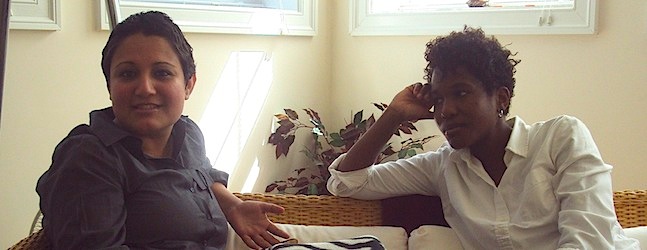
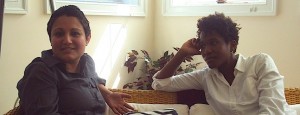
Zunaira Khalid (left) and her partner Ebony Bates in their basement apartment in Khalid's parents' house in Chantilly, Va. The couple says they're lucky most of the medical expenses from the June cancer surgery that claimed Khalid's leg were covered by insurance but only a small percentage will be covered for the prosthetic leg Khalid needs. (Washington Blade photo by Joey DiGuglielmo)
Zunaira Khalid benefit
Thursday at Policy
6:30 to 10 p.m.
Go here to make a donation.
Things were going pretty well for Zunaira Khalid and Ebony Bates in December. They’d had rough spots large and small throughout their nine-year relationship such as years of separation while Bates went to college in her native Pennsylvania, some occasional minor clashes that are inevitable in cross-cultural romances and all the usual pings and pangs that come and go as young people figure out what they want and don’t want from life.
But by the end of last year Khalid, a 35-year-old aspiring doctor and native Pakistani Muslim who’s been in the U.S. since age 12, and Bates, a 29-year-old Washington, Pa., native, realized their lives were beginning to jell. In October Bates landed what she calls her “dream job” with a government agency. She declines to say which because she says it’s not terribly gay friendly.
And after years of dabbling in various fields, Khalid, who’d drifted after finishing medical school questioning if she really wanted to be a doctor, decided medicine was her calling and she was in the uphill battle of getting back into the rigors of a residency program. Since 2005, the couple has lived in the basement of Khalid’s parents’ sprawling Chantilly, Va., home.
The two had been without health insurance for years. Bates was in school most of the ’00s doing undergrad and graduate work and Khalid had been unemployed for years studying to pass an exam to get back into medicine. The two had met in 2001 working together at Dulles Airport.
By December, Bates had coverage through her job. It took some arm twisting, but she convinced Khalid they needed to buy her some too, just in case. They found a decent plan for a little more than $100 per month through Aetna Health Insurance, an extraordinarily fortuitous decision on Bates’ part that saved the couple from financial ruin when Khalid got sick in February with an aggressive form of cancer that resulted in her leg having to be amputated in June.
“We were to the point where we’d been committed for several years,” Khalid says. “It’s almost impossible to have any sort of relationship recognition in Virginia, so that was never really discussed, but after D.C. passed marriage in December and then Ebony got a job she was like, ‘Look, we have a little money now, let’s get you a health plan. I didn’t think it was big deal. I don’t really get the flu or anything acute very often. I was like, ‘I’m fine, I don’t need it,’ but she was really adamant.”
To Khalid, she and Bates both burdened with considerable student loan debt, it seemed like one more expense. But she acquiesced and had an exam in December and got a clean bill of health.
The first signs of the cancer came innocuously in February. Khalid noticed her jeans felt tight around her left leg and took a bit of effort to get on. When it persisted, she had it looked at and was diagnosed with a pulled muscle. Just give it time to heal on its own, doctors told her. When it didn’t, she returned and an ultrasound found a cyst growing behind her knee. A biopsy revealed the mass was an aggressive sarcoma that was spreading fast. The situation quickly grew dire. It had grown from the size of a golf ball when an initial ultrasound was done to the size of a baseball a month later when an MRI was performed on Feb. 27.
Doctors told Khalid and Bates they were going to do everything they could to save her life and save her leg. It quickly became clear how potentially serious the diagnosis was.
“I remember when they said they were going to try to save her life first but we can’t guarantee that, that was really jarring for me,” Bates says. “Here they were talking about the possibility of death and if we were lucky she would make it through. It was just a lot of bad news at once.”
Bates, under pressure at her new job and in a probationary period where she knew she had to perform at her best, decided she needed to come out to her boss and explain the situation in case the stress started showing up in her performance. She was only able to miss a few days of work throughout Khalid’s illness, a point that irks the couple who marvel at the provisions that would be available if they were a married, opposite-sex couple.
But the couple opted to focus on the positive — most glaringly that Bates had the foresight to insist on an insurance plan for Khalid.
The first treatment step was two debilitating rounds of chemo, which destroyed Khalid’s immune system and put her in the hospital at Washington Hospital Center in D.C.’s Pleasant Plains neighborhood for weeks at a time. The chemo took such a toll — Khalid’s doctor told her he’d never seen anybody react so aversely to it — that a third round would have been too much for her body to handle. It was also unsuccessful at shrinking the mass to a degree doctors felt was acceptable.
There were essentially three problems with the growth — it had grown around a nerve meaning removing the mass would likely have resulted in Khalid having no control of her leg. Secondly it was so close to the bone, operating would be difficult and would have required, thirdly, a new route for blood supply to the leg, another iffy proposition considering the mass’s location. Amputation became the only safe option.
“I just realized very quickly that was the best decision I could make,” Khalid says. “I’d kind of prepared myself for it emotionally when they first told me it was a possibility. That first weekend, Eb had to be in Pennsylvania for work and I decided to go with her. It was the best thing. She was busy with work stuff but I just shopped, hung out at the hotel and really had time to make my peace with it.”
Bates soldiered on at work and says a strong relationship with Khalid’s parents — she says they treat her as if she, too, were their daughter — helped tremendously.
“Anytime I thought about how hard it was to juggle this with work, I just realized how much easier I had it compared to what she was going through,” Bates says.
Khalid is doing well now. She gets around on a pair of crutches cushioned with zebra-patterned covers. She was up and walking with a walker the day after her surgery. And she can still drive since she only needs to use her right leg.
The pain, though, has been excruciating at times. Muscle in her leg was essentially “wrapped” around hollow bone resulting in cookie-cutter like pressure from the bone’s edges. Khalid also experiences “phantom” pain where it feels as if her leg is still there, causing both pain and itching sensations.
“Basically the nerves have been cut but up here,” she says, pointing to her head, “it thinks everything is normal. So the nerves are freaking out and they don’t know what happened.”
She’s also stumbled several times as she attempts to get around.
The couple’s biggest challenge now is affording a massively expensive prosthetic leg for Khalid. The Aetna plan they chose has been great at kicking in thousands of dollars toward her chemo and surgery expenses but comes up far short on the cost of the prosthesis. The couple says it will cover only about $2,000 of the estimated $40,000 to $45,000 cost.
Friends are rallying. D.C. lesbian event promoter Ebone Bell has set up a website seeking contributions. Another lesbian friend, Darcy O’Callaghan, is planning an event Thursday at Policy for the couple. Donations are being accepted here.
Khalid says she’s keeping the stiff upper lip she’s maintained all along.
“I just decided up front I’m not going to cry about this,” she says. “I refuse to cry and give into this. If I have cried, it hasn’t been because of this stupid cancer, but because I’ve been touched by the things people have done for me.”
District of Columbia
D.C. police seek help in identifying suspect in anti-gay threats case
Victim threatened with assault, called ‘faggot’ as he left Capitals game
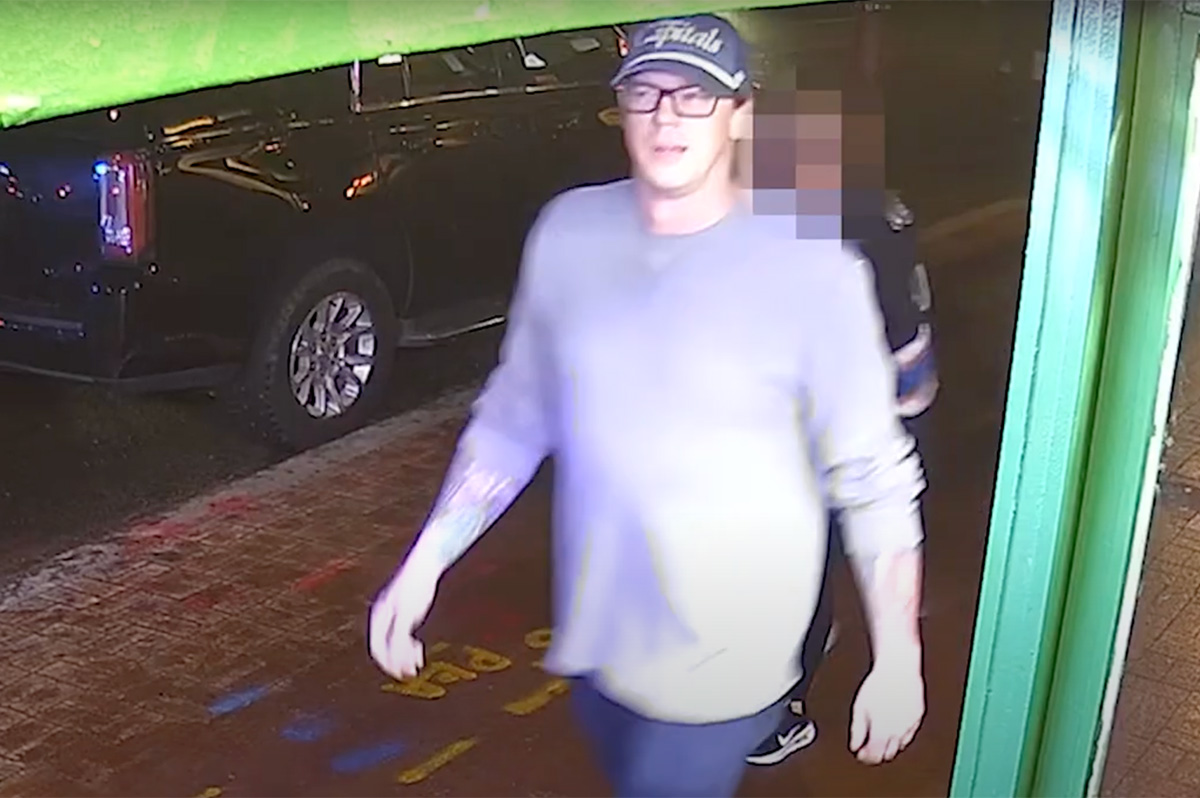
D.C. police are seeking help from the public in identifying a male suspect whose image was captured by a video surveillance camera after he allegedly shouted anti-gay slurs and threatened to assault a man at 6th and H Streets, N.W. on March 20 at about 9:54 p.m.
A police report says the victim told police the incident took place shortly after he exited the nearby Capital One Arena where he had attended a Washington Capitals hockey game.
The police report says the incident began when the victim saw the suspect yell a racist slur at a person behind the victim and started to berate a valet operator.
“Suspect 1 then turned his attention to Victim 1 and called him a ‘faggot’ among other homophobic slurs,” the report says. It says the victim then used his phone to record the suspect, prompting the suspect to walk away before returning and “snatching” the phone from the victim’s hand.
“Suspect 1 walked several feet as Victim 1 followed, requesting his phone back,” the report continues. “Suspect 1 stopped and turned to Victim 1 and while yelling other obscenities exclaimed ‘if you keep recording, I’m going to kick your ass.’” The report concludes by saying the victim was able to recover his phone.
It lists the incident as a “Threats To Do Bodily Harm” offense that is a suspected hate crime.
“Anyone who can identify this suspect or has knowledge of this incident should take no action but call police at 202-727-9099, or text your tip to the Department’s TEXT TIP LINE at 50411,” according to a separate police statement released April 23.
The statement says police currently offer an award of up to $1,000 to anyone who can provide information that leads to an arrest and indictment of the person or persons responsible for a crime committed in D.C.
D.C. police spokesperson Tom Lynch said the case has been under investigation since the incident occurred on March 20. He said the video image of the suspect, most likely obtained from a security camera from a nearby business, was released to the public as soon as it was obtained and processed through the investigation.
District of Columbia
Wanda Alston Foundation names new executive director
Longtime LGBTQ rights advocate Cesar Toledo to succeed June Crenshaw
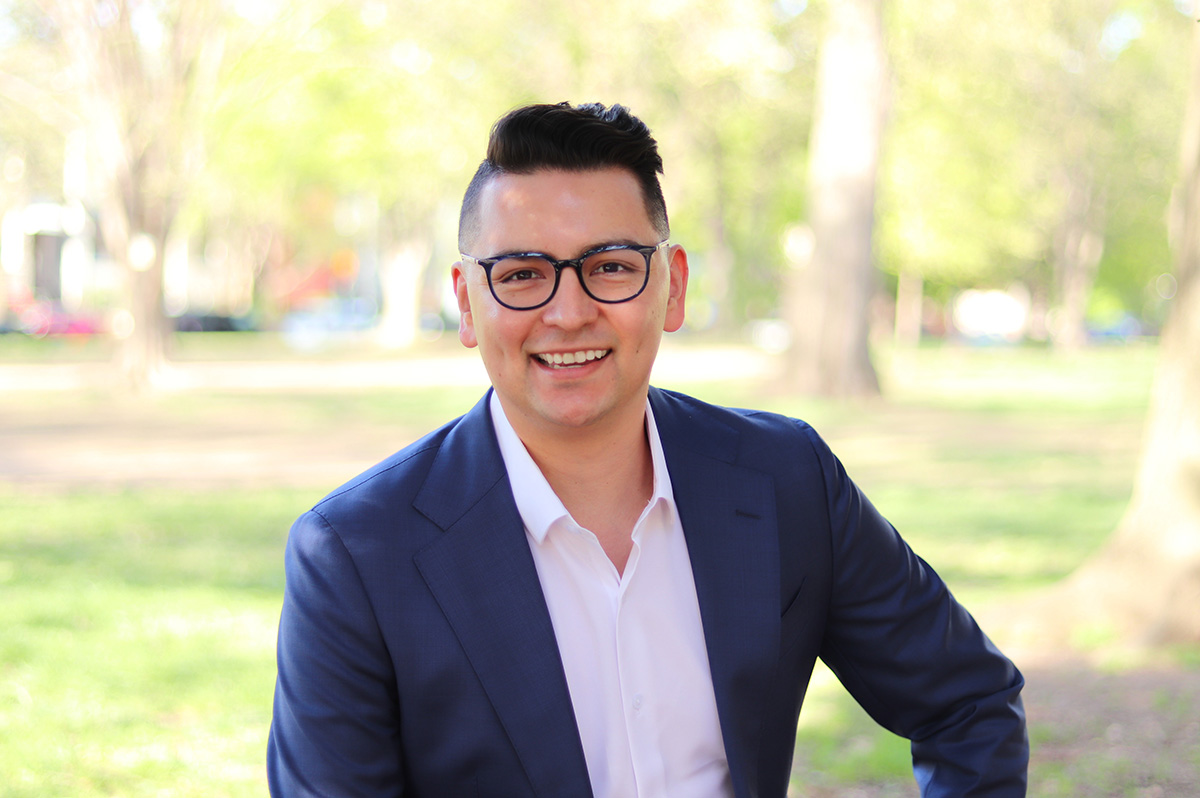
The Wanda Alston Foundation, the D.C.-based organization that has provided housing and support services for homeless LGBTQ youth since its founding in 2008, announced it has appointed longtime LGBTQ rights advocate Cesar Toledo as its new executive director.
In an April 22 statement, the organization said that as part of a planned leadership transition launched in November 2024, Toledo will succeed June Crenshaw, who Alston Foundation officials and LGBTQ community activists say has led the organization with distinction in her role as executive director for the past nine years.
In a statement released last November, the foundation announced Crenshaw was stepping down from her role as executive director after deciding to “to step into her next chapter.”
“June’s leadership has been truly transformative,” said Alston Foundation Board Chair Darrin Glymph in the group’s April 22 statement. “We are immensely grateful for her dedication and equally excited for the energy and experience that Cesar brings to lead us into this next chapter,” Glymph said.
“A seasoned LGBTQ+ advocate, Cesar brings over a decade of experience leading national campaigns, shaping public policy, and building inclusive communities,” the statement released by the group says. “Most recently, he served as the National LGBTQ+ Engagement Director for the Harris for President Campaign and has built a career focused on advancing equality and equitable education,” it says.
Biographical information about Toledo shows that immediately prior to working for the Harris For President Campaign, he served since April 2023 as deputy director for Democrats for Education Reform DC (DFER DC), a political group that helps to elect candidates for public office committed to quality education for all students, including minorities, people of color and LGBTQ youth.
Before joining DFER DC, Toledo served as political director for the LGBTQ+ Victory Fund, where he assisted in electing out LGBTQ candidates to all levels of public office across the U.S.
“I’m really excited about joining the Wanda Alston Foundation,” Toledo told the Washington Blade. “After a decade of working at the intersection of politics and policy and advancing political candidates and equitable education here in D.C., I wanted to shift my career to direct services to the most vulnerable folks in the LGBTQ+ family and our homeless youth,” he said.
Among other things, he said he would push for increasing the Alston Foundation’s visibility and mainlining its services for LGBTQ youth at a time when the national political climate has become less supportive.
A statement on its website says the Alston Foundation was founded in 2008 “in memory of Wanda Alston, a fierce LGBTQ+ activist, national advocate, and government official who was admired by District residents.”
The statement adds, “The foundation opened the first housing program in the nation’s capital in 2008 providing pre-independent transitional living and life-saving support services to LGBTQ+ youth.”
In a separate statement, the Alston Foundation announced it would hold a “thank you” celebration of appreciation for June Crenshaw from 6-8 p.m. on May 20 at Crush Dance Bar located at 2007 14th Street, N.W. in D.C.
“Let’s come together to celebrate her dedication and commitment for everything she has done for the LGBTQIA homeless youth population,” the statement says.
Virginia
Gay talk show host wins GOP nom for Va. lieutenant guv
John Reid becomes first out gay nominee for statewide office in state
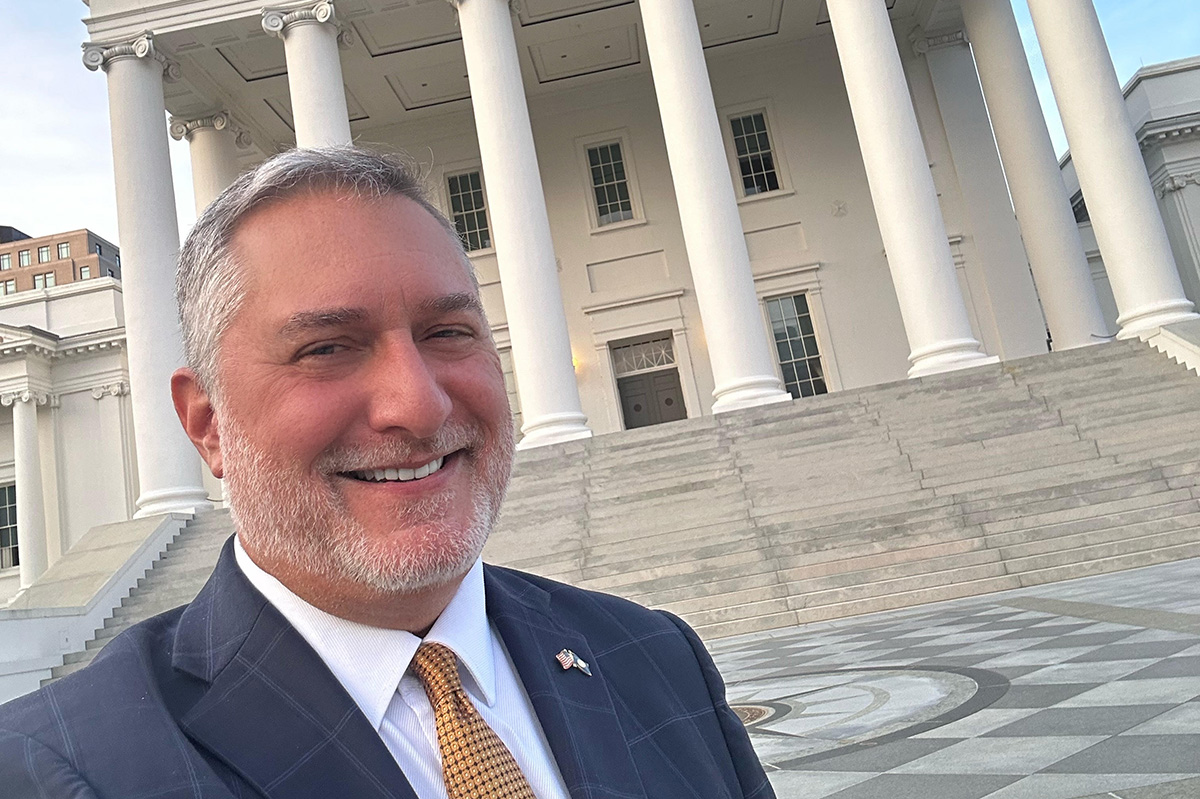
John Reid, a conservative gay radio talk show host in Richmond for many years, this week secured the Republican nomination for the office of lieutenant governor in Virginia, becoming the first known openly gay person to be nominated for a statewide office in that state.
Reid secured the nomination after his only rival in the Republican primary, Fairfax County Supervisor Pat Herrity, dropped out of the race this week for health reasons.
Herrity’s decision to withdraw from the race finalized the GOP nominees for Virginia’s three statewide contests in the November general election in what political observers are calling an unusually diverse GOP slate.
Current Virginia Lt. Gov. Winsome Earle-Sears, a Black woman, captured the GOP nomination for governor without a GOP opponent. Jason S. Miyares, a Hispanic man, is running for re-election as Virginia attorney general without a GOP rival. And Reid, a gay man, is the GOP nominee for lieutenant governor.
Reid will face one of six Democratic candidates for lieutenant governor who are competing in the June 17 Democratic primary.
The Blade spoke with Reid on Tuesday. Below is a partial transcript of that interview.
Blade: Is there a message you have for LGBTQ voters in Virginia, including Democrats, for why you think they should vote for you?
Reid: Well, the thing that I would say to gay voters who are looking and examining the candidates, is that I was out of the closet as a gay Republican publicly in very difficult rooms where people weren’t accepting of gay men – long before Donald Trump said I don’t care about this stuff.
And long before polite society said this was OK. So, in the ‘90s I came out on television and said on Oct. 11 – it was on National Coming Out Day. It was probably in 1996 or 1997. I started at the TV station in 1994. So, it was a couple of years into it.
I came out and said you never know your news anchor could be gay on National Coming Out Day. And everyone was appalled. How can you say this? You’re not supposed to say something like that. So even though I’m a Republican I know some people in the LGBT community are reflexively hostile to Republicans.
I took that step in public, and I think I helped change a lot of minds within the Republican Party and within central Virginia, which continues to be a pretty conservative place by being true to who I am. I spoke out in meetings around Republican staff and legislators and said I think we are not doing the right thing by being hostile to gay marriage.
We talk about the importance of family – Republicans talk about the importance of family, the importance of marriage as a fundamental building block of society. And a gay marriage is a net positive. Is it biblical to people who are following traditional Christian theology? No. But is it good for our society to have people in committed relationships? I think yes.
When we were going through the debate over gays in the military I said I see no reason that someone who is qualified to be in the military and can meet every single standard that everyone else is asked to meet, why should they not be in the Naval Academy, the Air Force Academy, West Point? Or serving as a grunt in active duty. Why would we exclude those people?
And those were very unpopular positions within the Republican Party.
Blade: Your campaign website says you have supported civil unions for same-sex couples. I could have missed seeing it, but I didn’t see an expression of support for gay marriage. Are you saying now that you support full same-sex marriage?
Reid: You know, you’re right. There is a distinction. And I think marriage is completely legitimate. Civil unions – if you want to go and sign paperwork at the courthouse – that’s great. If you want to be married and if a church wants to marry you if you find a church and religious leader and group that wants to bless that – that’s what I hope to do with my partner now.
Sometime in the near future I hope we will be married. And it’s very important to me as a Christian to be married in a church. So, that’s interesting. Most people would not draw that distinction. I appreciate that you’re drawing a distinction. I’m supportive of both.
Blade: Did you say you worked for a member of Congress? Can you say who that was?
Reid: George Allen, the senator from Virginia. And, of course, you and I – I know you’ve covered so many stories like this that you’ve brought together. But it was a very difficult position. When I started with Sen. Allen, he had a very libertarian attitude about this. The [Virginia State] constitutional amendment was not necessary. There was no need to go down that road.
And of course President Bush – George W. – was very assertive during the 2004 campaign. And then the issue continued to bubble up and you know we wound up with this amendment in the Virginia Constitution that banned gay marriage until the Supreme Court decision. And I was not supportive of that. And I voted for my boss, my senator, who I respected and still do respect.
Blade: Your website shows that your support for the gay community does not extend to the transgender community.
Reid: Yeah, I hate this. But I do think that our current focus on trans issues is where the gay rights movement has jumped the shark. And I think we’re losing support that we worked very diligently for decades to build with the average person. And I’m puzzled that the former leaders of the Human Rights Campaign had presidents when Elizabeth Birch and others – I don’t know what their stance is today.
I do recall that all of us who talked about gay rights issues focused on normalcy and that we would meet every standard that everyone else met. That all the vile things that were said about gays being pedophiles and grooming children – that simply was not true.
And I think we have stumbled into a very unfortunate and dangerous territory where we’re almost taunting the average person with an insistence that they accept drag queen story hour and the provocative books and provocative media that the average person would say, ‘You told us you were normal. – quote unquote normal – and now you are peddling an agenda which we don’t agree with and you’re being really aggressive about it.
And that’s really a difference. I know you’ve been covering it for a long time. I don’t know if you agree with this. I think we are peddling a very different political agenda today than the gay community was 20 years ago. And I think we should restrain ourselves and be cautious about that. And I think we’re in dangerous territory with the general population. And I’d urge caution about that.
Blade: Online reports show that there are as many as six Democratic candidates competing for the lieutenant governor’s position in the June 17 Democratic primary. Do you know any of them?
Reid: I’m familiar with most of them. Some are from the Richmond area. And I believe they are all very supportive of gay rights, which is I think a good thing. My reason for challenging them as a Republican – and I think there are other places where there is a lack of appropriate leadership and good judgment. And so, I don’t expect the gay issue would be a real issue. The trans issue may be a point of contention in the race.
But I don’t think the gay issue – and I do draw a distinction between the two — I don’t think that will be a real dividing line with those Democrat[ic] candidates.
Blade: So unlike when you were a TV news anchor, on your radio talk show were you able to offer more opinions and commentary?
Reid: That’s correct. There was a lot of opining, no script. So, I was able to tell stories about how I traveled to Miami, and I went to Washington. I went to the Kennedy Center and shared some of my life and lifestyle as appropriate with the audience.
Blade: Well, thank you for this interview.
Reid: I’m happy to talk to you. One of the reasons I called you back is that the political consultants have always told me don’t talk to anybody that might disagree with you. And I reject that. I have already lived 30 years as an out gay man. And it has been very difficult. And I would like to make it easier for the next generation to live their authentic selves. … Calling you and talking to you against the advice of all these people who say never do that, I’m hopeful that my willingness to engage and be candid will ultimately be well received, I hope.














